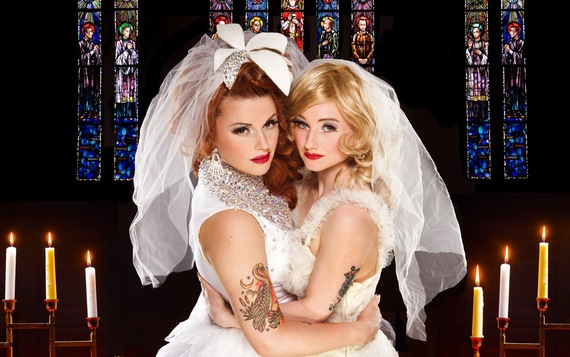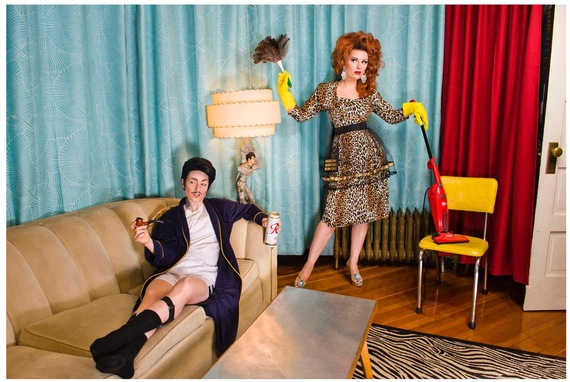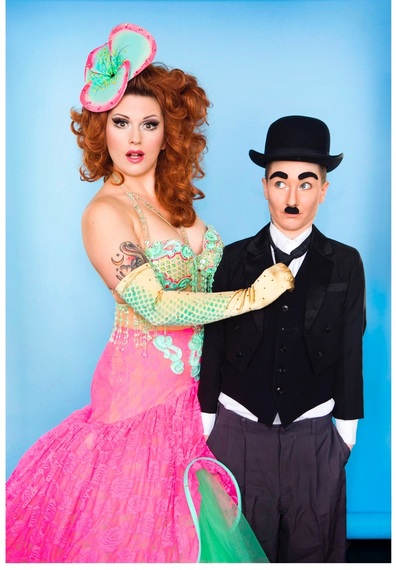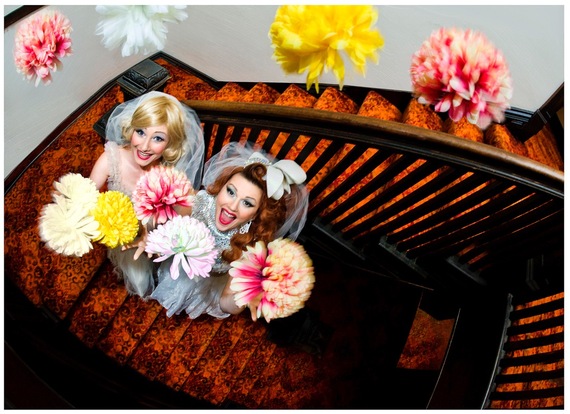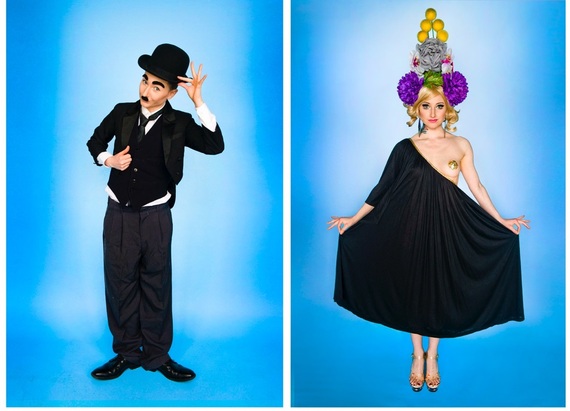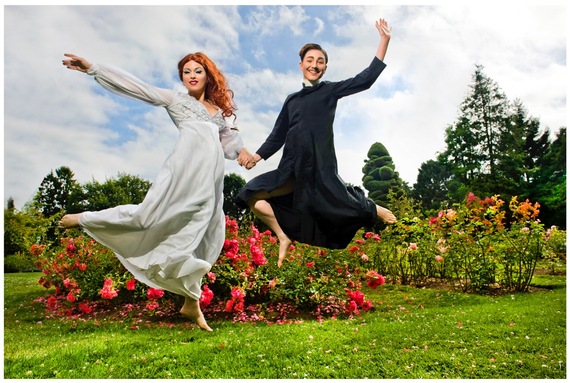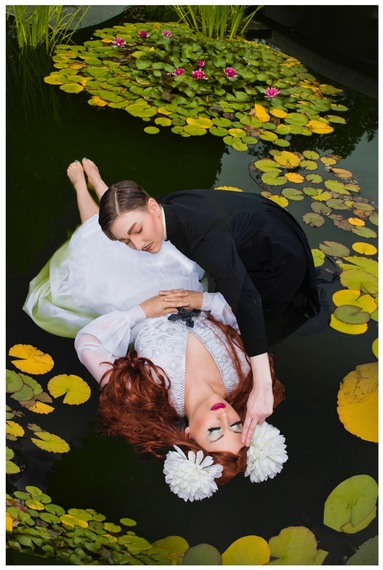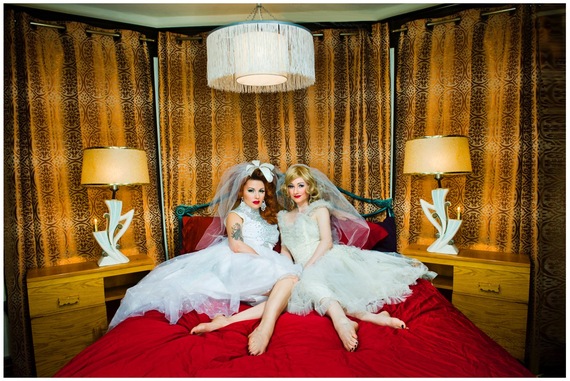In the worlds of burlesque, cabaret and queer performance there's no hotter couple right now than Kitten N' Lou. Blending humor and glamour, innocence and naughtiness, the campy dance duo had performed with Lady Gaga and Tony Bennett, co-produced epic shows with drag superstar BenDeLaCreme, and garnered numerous awards, accolades and devout fans from New York City to Australia. Their dance routines are both delightfully classic and unassumingly gay, putting a queer spin on Americana.
Their act is a genius invention of a real life married couple. Kitten LaRue, whom Dita Von Teese calls "polished, clever and glamorous", has been a major force in the neo-burlesque renaissance and is the leader of the critically acclaimed, Atomic Bombshells. Her counterpart, Lou Henry Hoover, is an adorably Chaplinesque boy-drag creation of the modern dance choreographer, Ricki Mason. This year Kitten N' Lou premiered their first evening-length duet OVEREXPOSED! which opened at NYC's Joe's Pub. Also, returning this year are their perennial favorites - The Atomic Bombshell's retro-futuristic extravaganza, LOST IN SPACE!, and the BenDeLaCreme co-production Homo for the Holidays which has grown from a cherished Seattle tradition to a destination show that draws fans from all over the world. I interviewed Kitten and Lou about their inspirations and current projects.
WES HURLEY: You two had very different paths creatively but both ended up in burlesque. Can you talk about how it all started?
KITTEN LARUE: I have a lifelong background in dance and theater, but really found burlesque living in New Orleans right after I graduated from college. I went to see The Shim Shamettes and fell in love with the art form: the glamour, the pageantry, the camp, the fantasy. I auditioned for a show, and the rest is history.
LOU HENRY HOOVER: I moved to Seattle to pursue a dance career. I was attracted to the Seattle scene because it seemed to be run by women creating their own opportunities. I was fully immersed in my career as a dancer and choreographer when Waxie Moon asked me to perform in a burlesque show that he was choreographing. I said yes because I will say yes to anything that brilliant creature asks me to do. I was attracted to the burlesque world, and I was seeing women be incredibly powerful onstage in their artistry and their owning of their bodies, sexuality, and storytelling. I wanted to be part of it but performing as a fancy lady I couldn't quite feel the empowerment I was seeing. Waxie, again, asked me to create a boylesque act for a show he was producing. I had already started playing with drag in my dance work, and I leapt at the chance to combine drag, dance, and burlesque in my own way, to use artifice to tell stories that are true and empowering to me. I was completely hooked on the immediacy and intensity of the energetic exchange between audience and performer in this form. And it's a form where women are making their own opportunities and running the scene not just in Seattle but all over the world. Since it's less institutionalized than dance, there hasn't been as much time yet for men to take over the successful enterprises of women and queer people.
WH: You've traveled and performed all over the world, both as part of The Atomic Bombshells and Kitten N' Lou. Are you seeing any regional differences in how burlesque is approached by performers or received by audiences?
KL: Honestly, not too much. The internet has allowed burlesque to become one big international conversation, where people are constantly sharing and exchanging ideas, aesthetics, and trends, so you see a lot of similar approaches happening all over the world. Except Japan. You will never see anything like Murasaki Baby Doll.
LH: There's a lot of crossover because we get to see each other's work. But there's still certainly regional differences based on culture and economics. For example in Seattle we have these fantastic theaters where we do longer runs of shows yearly or every couple of years, so it makes sense to invest in a big prop or costume to bring out in a U-Haul once a year. In New York you're more likely to invest in solving the puzzle of what's the most impressive costume you can fit in a bag you can maneuver around the subway! There are also performers who really seem to capture the essence of their homeland - I'm thinking of Bettie Blackheart from Helsinki as an example, and the Murasaki Babydolls could only be Japanese! I adore that uniqueness, and I do think of Kitten N' Lou as distinctly American, nostalgia is such a huge part of our aesthetic.
WH: Who are your biggest inspirations for your respective personaes?
KL: I have so many, but I would say my go-to's are Ann-Margaret, Pee-Wee Herman, RuPaul, and Lucille Ball. I think there's a common thread of carefully calculated maniacal energy and side-eye in all of my idols.
LH: I'm inspired by performers who are great story tellers - Dina Martina, Bridget Everett, Miguel Gutierrez. I'm inspired by classic physical comedy, I think Charlie Chaplin is the most obvious reference. I'm inspired by iconic gay imagery, like Pierre et Gilles' sailors and Tom of Finland... well, all his guys - talk about perfectly bulging pants!
WH: Kitten'n'Lou play with gender and sexuality, and even though your acts are not political on the surface, you do promote gay visibility through your work. There's really nobody doing what you do as a couple. What kind of reactions have you gotten from the gay community? Has there been any backlash from more conservative venues or burlesque organizations?
KL: It's been truly incredible and humbling to see how our community has championed us. We haven't felt too much of a backlash from conservative venues but I think there are two reasons why. First of all, the burlesque world, while still having a great deal of work to do to represent true diversity, in general is more open to ideas of non-conformity. And two: we are producers, so we create many of our own opportunities, and therefore aren't solely reliant on the booking preferences of other people. We also try to create work that any audience could enjoy, but that is inherently subversive, as we are a married lesbian couple who perform gender with artifice and drag. At the end of the day we want to put on the biggest, best, most entertaining show we can...it's like the "spoonful of sugar" that makes our big ol' homosexual agenda slide down nice and easy.
LH: I always say I'm painting my queerness on my face, and then telling a story about my humanity onstage. So the performances are universal, but we're definitely presenting queer bodies onstage. We have been incredibly supported by gay communities, it's really fun to meet all kinds of queer folk who like what we're doing. We've also been presented by lots of festivals and organizations that do not specifically have queer interests in mind. I think we have a much broader appeal. The nostalgia of our work really resonates with an older generation that I think is sometimes more conservative. Our hope is that people forget they're watching queer artists and just get into the act. And if that leads to an audience member appreciating queer artists in a new way, that's really fantastic.
WH: Could you talk a bit about your current show OVEREXPOSED!? How is it different (if it is) from your previous work?
KL: It's quite different from our previous work, in that it is an entire show of just us....it features some of our more well-known acts, but also gives you a deeper and more surreal glimpse into what it's like to be "the world's show-busiest couple." We take you on a theatrical journey of love, laughs, tears, and nudity. When I'm performing in a typical burlesque show, it's all about an armor of glamour: fabulous costuming, perfect makeup, coy sensuality, rhinestones. In this show, there is that, but I also get to eat my feelings wearing nothing but a greasy bag of potato chips as my entire face melts off. It's exciting and terrifying to perform a new level of vulnerability... I don't get to feel terrified onstage much anymore.
LH: OVEREXPOSED! is our first evening length duet together. We've collaborated a lot over the past five years, but never in quite this capacity. It's really thrilling to get to bring to the stage both our biggest showiz acts alongside a kind of theater that only works in longer form. We get to use duration in a way that doesn't really work in a five minute act. It's also intensely pleasurable to me to go from the density of one of our burlesque acts to scenes where we draw time out and extend an emotion. I'm proud of the ways we pushed each other's range for this show. We get to really BE Kitten N' Lou onstage for a full 70 minutes, be that dancing, masturbating, or having a picnic.
WH: Kitten, what inspired you to create the fabulous LOST IN SPACE! show?
KL: LOST IN SPACE! is a show that I conceptualized and created for The Atomic Bombshells in 2010. I've always been inspired by the music and visuals of mid-century retro-futurism: Esquivel, Joe Meek, 50's Sci-Fi, The Jetsons. Not only because aesthetically it's so weird and wild, but because I was also interested in exploring this cultural moment when people were idealistic (or naive) enough to believe and imagine that the not-too-distant future held such fantastical notions of a new world. People were trying to escape the sobering realities of the Red Scare, sexual oppression, and civil rights struggles with visions of rocket ships and moon people.
LH: I had the intense pleasure of getting to see LOST IN SPACE! before I became an Atomic Bombshell and joined the cast. It's such a visual feast! And the music is incredibly well-curated. Kitten is a real genius at choosing the perfect unique music to not only make each moment special, but to take the audience on a journey throughout the night. I love how specific the references are, while still maintaining a universality - you don't have to know anything about sci-fi, space, or the 60s to get the show. It's also weird in a really amazing way, I remember being super captivated by how strange and unexpected the ending of the show is... I won't give it away, you'll have to come see for yourself.
WATCH: Lou Henry and BenDeLaCreme in LOST IN SPACE!
WH: You met and started to create together in Seattle - home to many amazing burlesque/drag/performance personalities. What do you think it is about Seattle that draws and inspires so many talented LGBT performers?
KL: All roads lead to Dina Martina.
LH: Seattle is such a great incubator! It has a history of being one of the gayest cities in the US. The city loves and supports the arts. Studio space is (again relatively) affordable and easy to get to and fun to be in. There's tons of opportunity at the "emerging artist" level. I think artists come to Seattle and get well nourished, and for some of us we do it long enough that we no longer have any other marketable skills so we just have to keep going!
WH: What do you see as the next frontier for neo-burlesque?
KL: I see it starting to happen now: the convergence of true personal expression and commerce. You can make art that's meaningful to you, and still pay your bills with it. I also see (hope for?) more diversity beginning to be represented in burlesque. There's so much more to this form than just skinny white ladies in really expensive gowns. The amazing thing about the new burlesque is that it is not meant to exist exclusively for the white heterosexual male gaze, which means that shows could and should be presenting a wider variety of performers. The audience for burlesque continues to expand, as does the palate.
LH: Oh man, that's a big question. I think burlesque is a form that many artists, especially queer artists, are attracted to because it's a little bit underground, a little bit taboo. But it's getting bigger and more popular and more accepted, so how does that affect the form? I think I'm too inside it to predict where it's headed. I just know I'm going to keep pursuing whatever interests me as an artist, and hopefully people will keep wanting to come see whatever that is!
